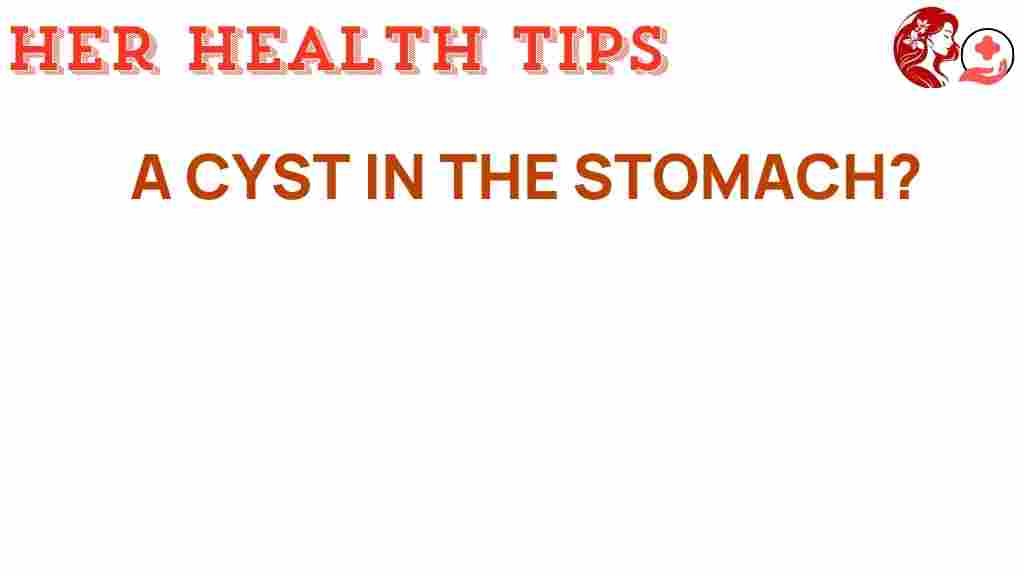Unraveling the Mystery: What a Cyst in the Stomach Could Mean
A cyst in the stomach can be a source of concern for many individuals. Understanding what it represents is crucial for maintaining health and wellness. This article aims to provide comprehensive insights into stomach cysts, including their symptoms, diagnosis, treatment options, and overall health implications. By increasing awareness of these cysts, individuals can take proactive steps toward their health.
What is a Cyst?
A cyst is a closed sac-like structure that can be filled with fluid, semi-solid material, or gas. Cysts can form in various parts of the body, including the stomach. While many cysts are benign (non-cancerous), some may require medical attention. Their presence in the stomach can indicate various health conditions.
Types of Cysts in the Stomach
There are several types of cysts that may develop in the stomach area. Understanding these types can aid in diagnosis:
- Gastric Cysts: These are fluid-filled sacs that develop in the stomach lining. They are often asymptomatic.
- Pancreatic Cysts: These may develop in the pancreas and can affect digestion.
- Ovarian Cysts: In females, cysts can form in the ovaries and may cause abdominal discomfort.
- Mesenteric Cysts: Rare cysts that can develop in the mesentery, the tissue that attaches the intestines to the abdominal wall.
Symptoms of a Cyst in the Stomach
Many individuals with cysts in the stomach may not experience noticeable symptoms. However, when symptoms do occur, they can vary widely based on the type and size of the cyst. Common symptoms include:
- Abdominal pain or discomfort
- Bloating or fullness
- Nausea or vomiting
- Changes in appetite
- Weight loss
- Fever (in cases of infection)
If you experience any of these symptoms persistently, it is essential to consult a healthcare provider for a proper diagnosis.
Diagnosis of Stomach Cysts
Diagnosing a cyst in the stomach typically involves a thorough medical examination and various diagnostic tests. Here’s a step-by-step process for diagnosing stomach cysts:
- Medical History Review: Your healthcare provider will ask about your symptoms, medical history, and family history.
- Physical Examination: A physical exam may involve palpating the abdomen to detect any unusual masses.
- Imaging Tests:
- Ultrasound: A non-invasive test that uses sound waves to create images of the organs.
- CT Scan: Provides detailed cross-sectional images of the abdomen to identify cysts.
- MRI: Useful for evaluating cysts in more detail, especially in complex cases.
- Biopsy: In some cases, a tissue sample may be taken to assess the cyst’s nature.
Treatment Options for Stomach Cysts
The treatment for a cyst in the stomach depends on various factors, including the type of cyst, its size, and any symptoms present. Here are some common treatment options:
- Observation: If the cyst is small and asymptomatic, your doctor may recommend regular monitoring.
- Medications: In cases where infection is present, antibiotics may be prescribed.
- Surgical Removal: If the cyst is large, symptomatic, or suspected to be cancerous, surgical intervention may be necessary.
It’s important to discuss all treatment options with your healthcare provider to determine the best course of action for your specific condition.
Wellness and Prevention
Maintaining a healthy lifestyle can help reduce the risk of developing cysts in the stomach. Here are some wellness tips:
- Healthy Diet: Consume a balanced diet rich in fruits, vegetables, whole grains, and lean proteins.
- Regular Exercise: Engage in regular physical activity to maintain a healthy weight and improve digestion.
- Stay Hydrated: Drink plenty of water to support overall health and digestion.
- Avoid Smoking and Excessive Alcohol: These habits can increase the risk of developing various health issues, including cysts.
Troubleshooting Common Concerns
If you suspect you have a cyst in the stomach or are experiencing symptoms, consider the following troubleshooting tips:
- Keep a Symptom Diary: Document your symptoms, including their frequency and intensity, to discuss with your doctor.
- Research Your Family History: Understand any hereditary conditions that may contribute to cyst formation.
- Follow Up on Diagnostic Tests: Ensure you follow through with any recommended imaging or tests to get an accurate diagnosis.
For more detailed health-related articles, check out this resource on common abdominal issues.
Conclusion
A cyst in the stomach can signify various underlying health conditions, and understanding this can empower individuals to seek timely medical attention. By recognizing symptoms, undergoing proper diagnosis, and following appropriate treatment plans, individuals can maintain better health and wellness. Awareness is key—if you experience any concerning symptoms, do not hesitate to consult your healthcare provider.
For more information on health and wellness, visit this external site.
This article is in the category Conditions and created by HerHealthTips Team
